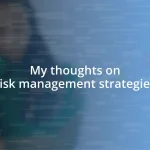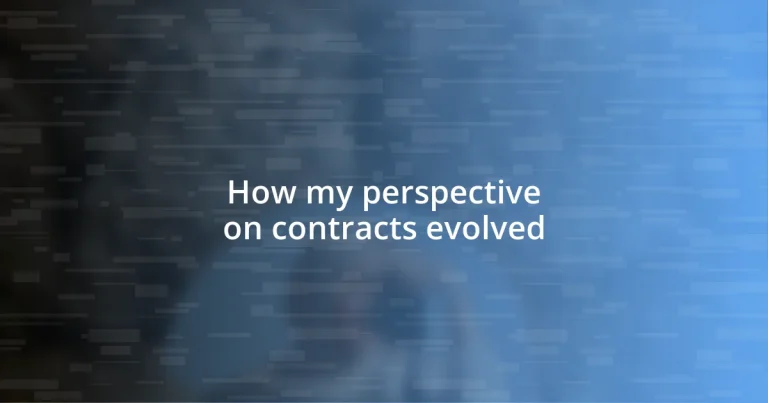Key takeaways:
- Contracts establish trust by clearly outlining expectations and responsibilities, preventing misunderstandings that can arise from verbal agreements.
- Flexibility in contract management, including regular communication and adaptability to changes, is essential for maintaining productive partnerships.
- Future contract evolution will likely leverage technology, fostering collaborative and emotionally intelligent negotiations for enhanced relationship building.
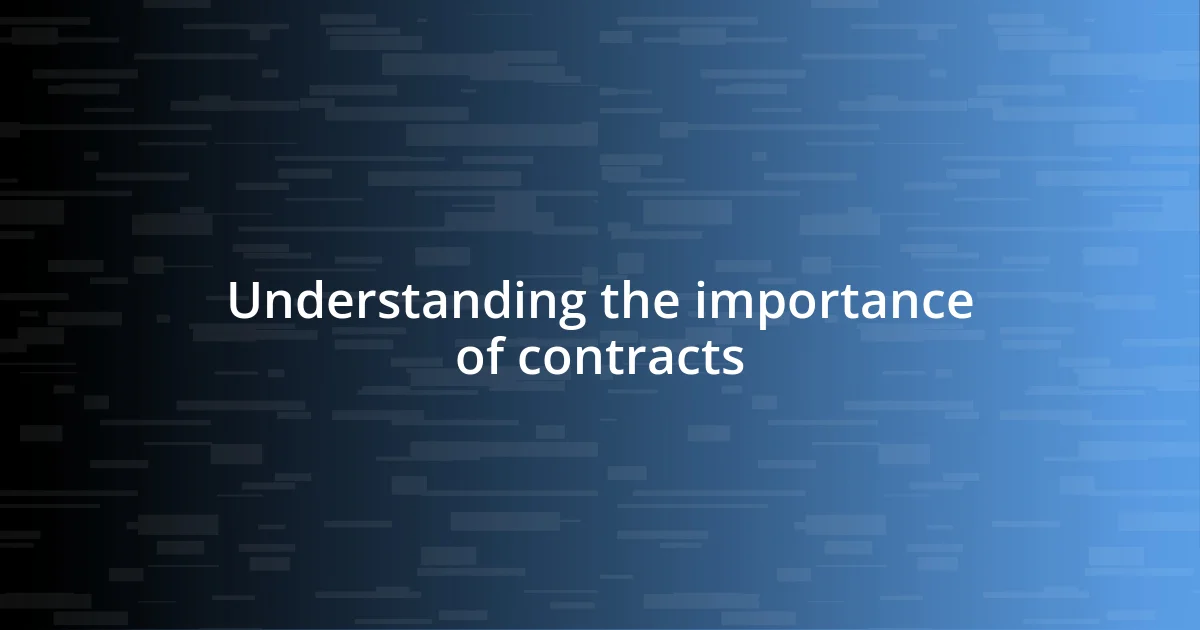
Understanding the importance of contracts
Contracts serve as a crucial foundation in any agreement, clarifying expectations and responsibilities. I remember my first experience drafting a partnership contract; I felt a mix of excitement and apprehension. It dawned on me then that a solid contract isn’t just words on paper but a mutual understanding that protects all parties involved.
Reflecting on my journey, I’ve come to recognize that contracts are often the backbone of trust in business relationships. Have you ever felt uneasy about a verbal agreement? I certainly have. Once, I relied on a handshake to seal a deal, only to find myself facing misunderstandings that could have been avoided had there been a written contract in place.
In my experience, having a contract is like wearing a safety belt in a car; it’s there to protect you from the unexpected. I’ve learned the hard way that overlooking this can lead to chaos and heartbreak. Contracts not only outline what is expected but also provide a roadmap for resolving disputes should they arise, making them indispensable in any professional landscape.
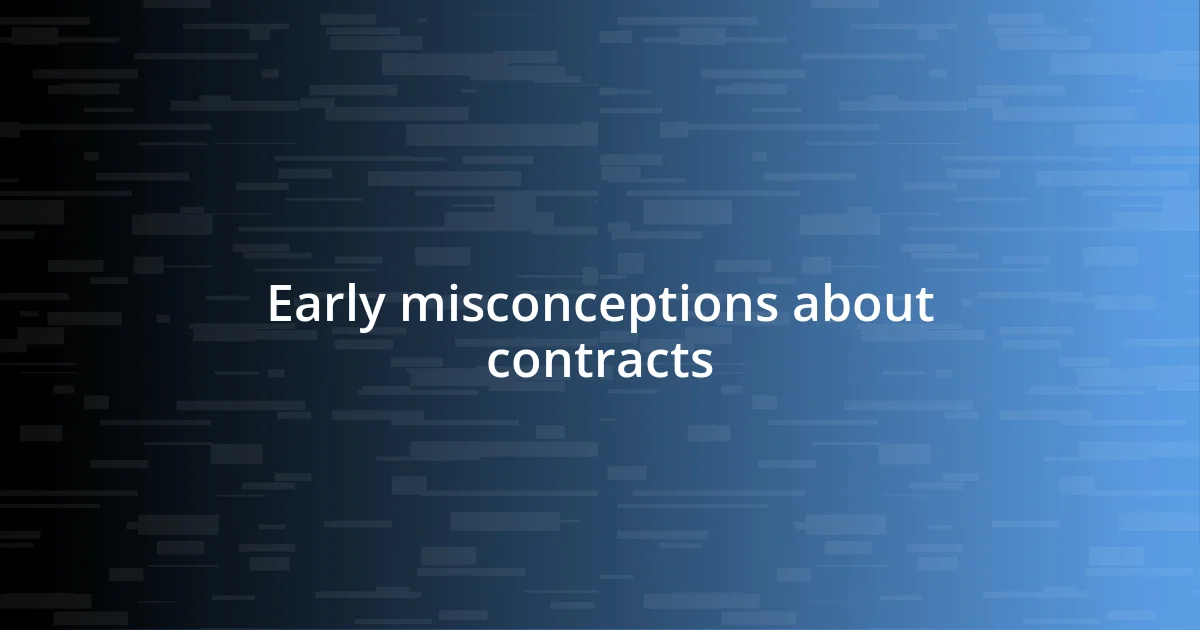
Early misconceptions about contracts
It’s interesting to reflect on my early misconceptions about contracts. For a long time, I viewed them merely as legal formalities, something only lawyers dealt with. I recall a time when I thought that if an agreement was simple enough, a contract wasn’t necessary. However, my viewpoint shifted dramatically after a small project went awry due to misunderstandings that could have been easily avoided with clear written terms.
Here are some common misconceptions I used to hold:
- Verbal agreements are sufficient: I believed a simple handshake was enough, but I learned that memories can fade and interpretations can differ.
- Contracts are only for large transactions: I thought they were only necessary for major deals, but even small projects can benefit from clarity.
- Once signed, it’s set in stone: I initially viewed contracts as unchangeable, not realizing they can and should evolve with circumstances.
These realizations taught me that contracts are living documents that adapt to the needs of both parties, fostering trust and transparency.
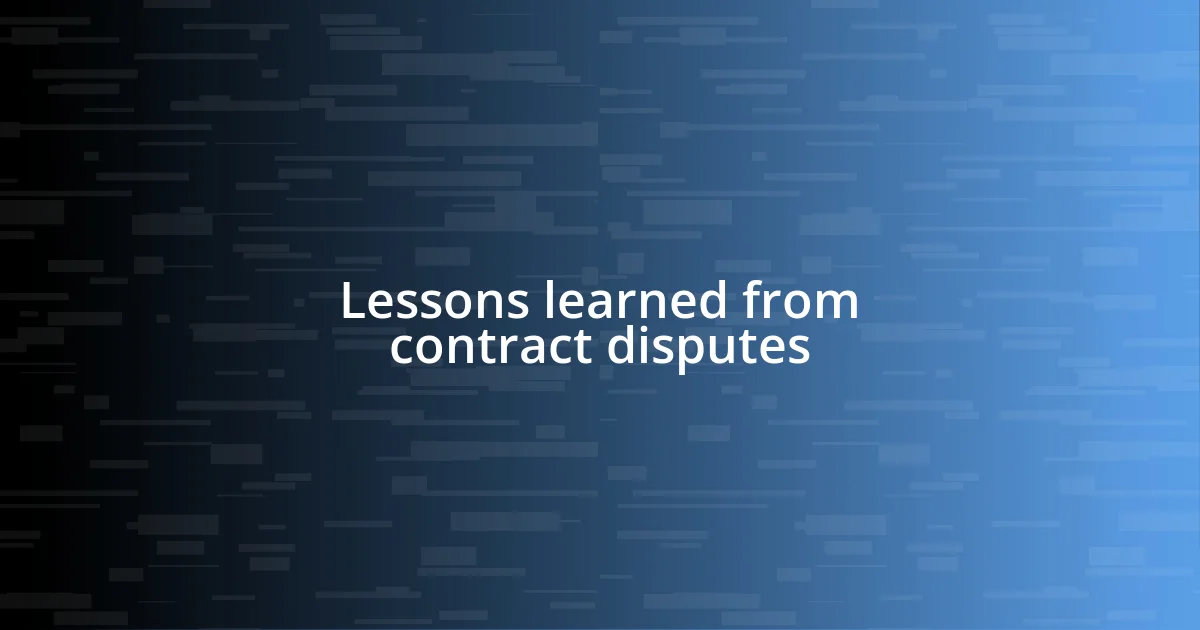
Lessons learned from contract disputes
Lessons learned from contract disputes have deeply shaped my understanding of agreements and their implications. One dispute stands out vividly in my memory. I was part of a collaboration with a vendor, and everything seemed aligned until we hit a snag over deliverables. The absence of a clearly defined timeline in our contract led to tensions that could have been easily avoided. I realized then how vital it is to be specific; without clarity, assumptions can spiral into conflict, causing unnecessary stress for everyone involved.
In navigating these disputes, I’ve also learned the importance of open communication throughout a contract’s lifecycle. It’s not enough to draft an agreement and forget about it. I’ve seen firsthand how periodic check-ins can ease tensions and keep projects on track. For example, I once worked with a team that met monthly to review our objectives and adjust the terms as needed—what a refreshing change! When issues arose, addressing them in real-time helped us avoid a full-blown dispute, creating a collaborative environment instead.
Finally, one key lesson I’ve grasped is that every disagreement is an opportunity for growth. They push you to refine your negotiation skills and gain insights into the other party’s perspective. After a difficult negotiation with a former partner, I took the time to reflect and realized that the lessons learned made me a better communicator for future contracts. Ultimately, these experiences highlighted that disputes, while uncomfortable, can be invaluable teachers.
| Lesson | Insight |
|---|---|
| Specificity is Key | Clear terms prevent misunderstandings. |
| Communication is Crucial | Regular updates keep relationships healthy. |
| Growth Opportunities | Disputes can enhance future negotiation skills. |
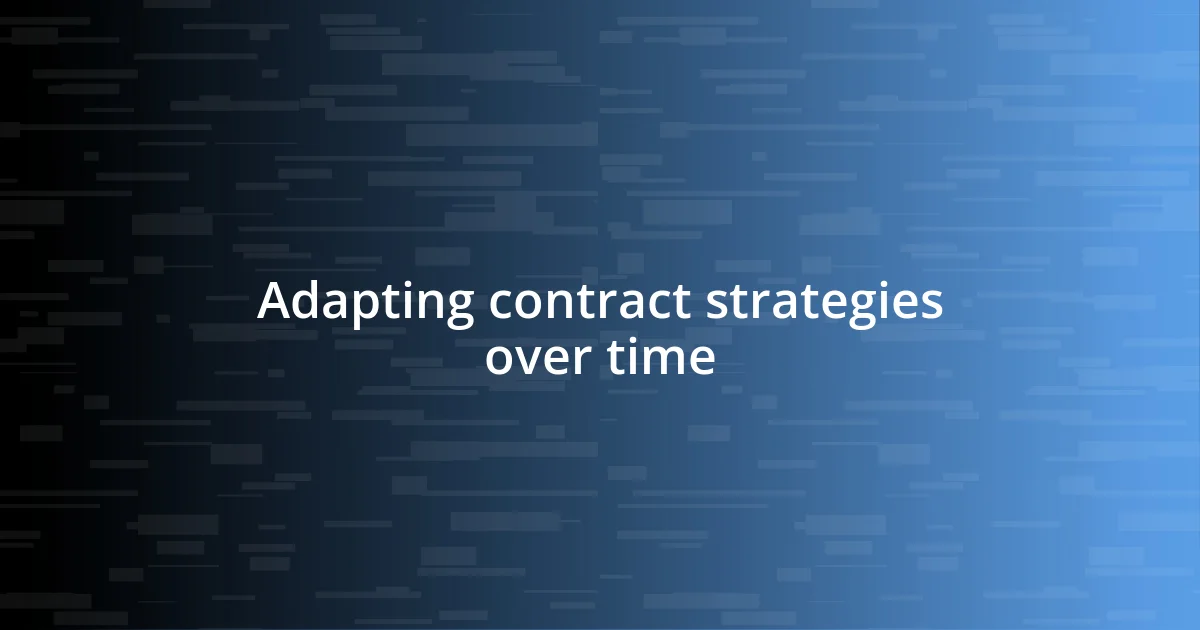
Adapting contract strategies over time
Adapting my contract strategies over time has been a significant journey. Early on, I solidified rigid agreements, treating them like final endpoints. But I quickly learned that flexibility is essential. I recall a project where we decided, mid-way, to incorporate some new deliverables based on client feedback. Revisiting the contract allowed us to acknowledge these changes, showcasing the importance of viewing contracts as adaptable tools rather than static documents.
When reflecting on how my approach has evolved, I’ve come to appreciate the nuances of collaboration. I remember working with a partner who had a vastly different communication style, which often left me frustrated. Rather than sticking to the original terms, we agreed to modify our contract to include regular brainstorming sessions. This adjustment not only improved our working relationship but also led to innovative solutions we hadn’t anticipated. Isn’t it fascinating how simply modifying a contract can breathe new life into a partnership?
Over time, I’ve also become more proactive in addressing the potential for change. In a recent project, we included a ‘change order’ clause in our contract right from the start. This clause allowed us to address unforeseen circumstances without the dread of lengthy negotiations. Have you ever found yourself stuck in a rigid agreement? I can assure you, preparing for changes in advance makes a world of difference, transforming contracts into living instruments that grow alongside our professional relationships.
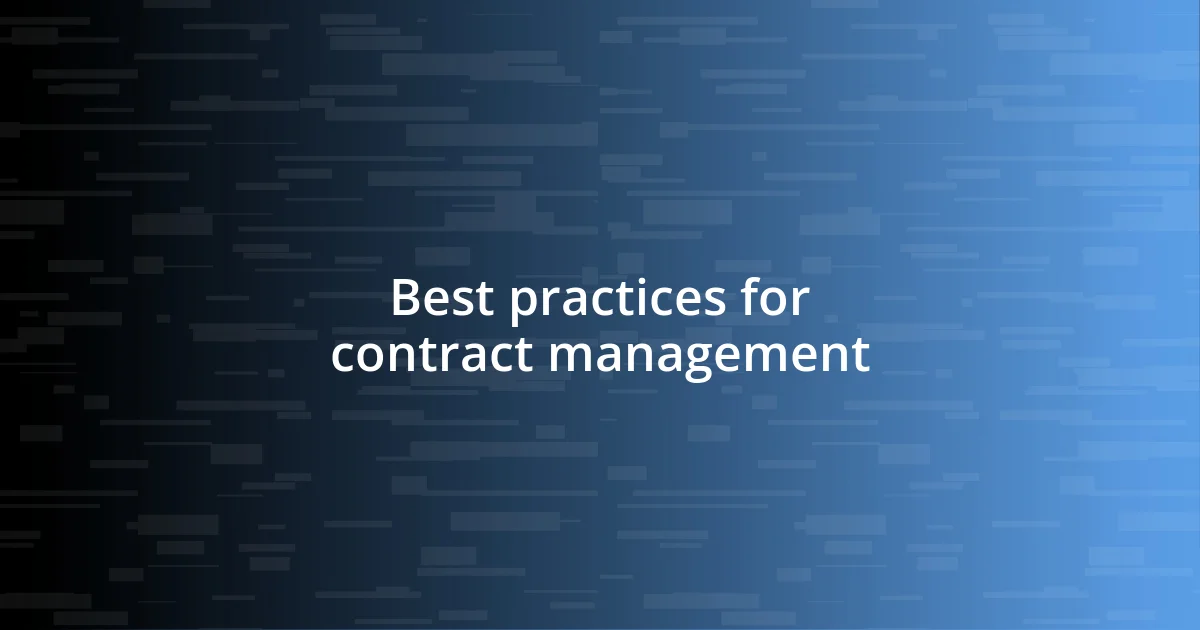
Best practices for contract management
Managing contracts effectively requires attention to detail and a clear understanding of expectations. One practice that’s truly transformed my approach is using a centralized contract management system. I vividly remember the chaos of scrambling through emails and paper files in an earlier project. Switching to a digital platform not only helped me track deadlines and deliverables but also ensured that everyone involved had access to the latest information. Isn’t it reassuring to know that all your agreements are just a click away?
In my experience, developing a checklist for contract reviews has been invaluable. I recall a particularly stressful negotiation in which we missed an important compliance requirement. This oversight not only delayed the project, but also strained relationships with stakeholders. Now, I always ensure that my checklist includes compliance checks, deliverable milestones, and communication protocols. This simple tool has saved me countless headaches and fostered transparency with my partners.
Lastly, I emphasize the significance of post-contract evaluations. Reflecting on previous contracts has allowed me to glean insights about what worked and what didn’t. I once conducted a review after a year-long partnership, where we discovered several areas for improvement in our communication. By gathering feedback from all parties, we were able to strengthen our future agreements. Doesn’t it make sense to learn from our experiences? It’s this ongoing process of reflection that continually enhances my contract management skills.
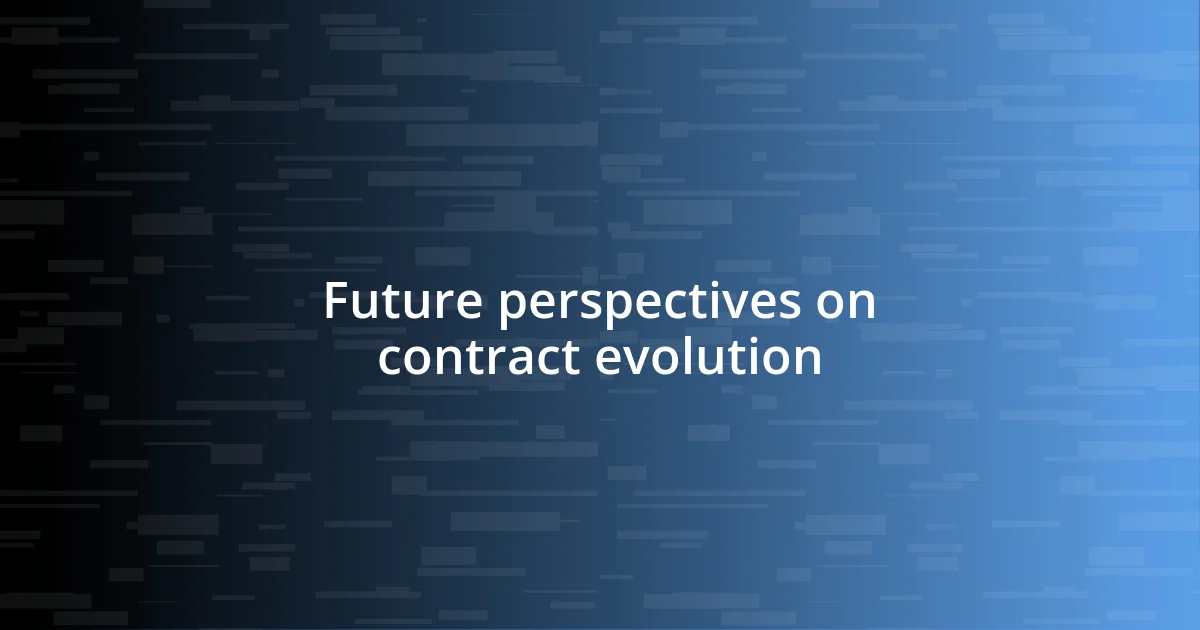
Future perspectives on contract evolution
As I look ahead, I can’t help but think about the growing importance of technology in contract evolution. With the rise of artificial intelligence and blockchain, contracts may soon become self-executing and smarter than ever. Have you ever imagined a world where agreements automatically adjust based on real-time data? I find it exhilarating to think that we might soon minimize misunderstandings and disputes, making our professional interactions more streamlined and efficient.
The shift toward collaborative contracts is another perspective I foresee. In my experience, fostering continuous dialogue with partners has always led to greater understanding and innovative problem-solving. What if, instead of sticking to a rigid contract, we created a living document that adapts as our needs change? This dynamic approach not only fosters trust but also allows room for creativity, where we can co-create solutions that benefit everyone involved. It’s something I’ve started to embrace, and it feels liberating.
Lastly, I’m increasingly convinced that emotional intelligence will play a pivotal role in future contract negotiations. Think about it: understanding the feelings and motivations of all parties can lead to more empathetic agreements. Have you ever felt your negotiation became more about emotions than logic? I know that feeling well. By prioritizing emotional awareness, I believe we can forge stronger partnerships and avoid the pitfalls of miscommunication. Embracing this perspective not only enriches our professional experiences but also paves the way for more meaningful collaborations ahead.






